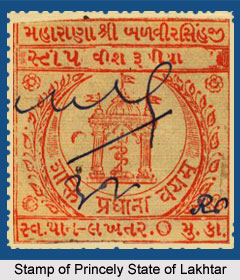 The Princely State of Lakhtar, also known as Than Lakthar state, was amongst the major native states during the rule of the British Empire in India. During the early 19th century, the region was appointed as one of the princely states of India under the indirect rule of the British administration. The territory covered a total area of 247.43sq miles and comprised of a total population of 26,780 in the year 1941. The territory was located in northern Kathiawar and included around 50 villages. The princely state of Lakhtar comprised of a prime block of territory and 5 remote districts. The region was bordered by the princely state of Bajana in the north; by the British district of Ahmedabad and the princely state of Vithalgadh in the east; by the princely state of Limbdi and the talukas of Wadhwan District Thana in the south; and the princely state of Dhrangadhra in the west. The town of Lakhtar was located in the main district and was around 30 miles towards the north of the town of Limbdi. The Lakhtar state also included the village of Than.
The Princely State of Lakhtar, also known as Than Lakthar state, was amongst the major native states during the rule of the British Empire in India. During the early 19th century, the region was appointed as one of the princely states of India under the indirect rule of the British administration. The territory covered a total area of 247.43sq miles and comprised of a total population of 26,780 in the year 1941. The territory was located in northern Kathiawar and included around 50 villages. The princely state of Lakhtar comprised of a prime block of territory and 5 remote districts. The region was bordered by the princely state of Bajana in the north; by the British district of Ahmedabad and the princely state of Vithalgadh in the east; by the princely state of Limbdi and the talukas of Wadhwan District Thana in the south; and the princely state of Dhrangadhra in the west. The town of Lakhtar was located in the main district and was around 30 miles towards the north of the town of Limbdi. The Lakhtar state also included the village of Than.
History of Princely State of Lakhtar
The Jhala Rajputs were the ruling family of the princely state of Lakhtar. The estate was established by Abahya Singh, who was a younger son of the ruler of Dhrangadhra, in the year 1604. Almost 11 native rulers had succeeded to the royal throne by the beginning of the 20th century. The native prince of the princely state held the title of Thakor Sahib. The title was conferred in the year 1927. During this period, the jurisdictional authority of the native ruler was also increased. The Thakor Sahib of Lakhtar state exercised full civil and criminal jurisdiction, which was subject to the general restrictions related to capital offenses. The native state paid annual tribute to the princely state of Junagadh. Until the class system was abolished in the year 1925, the princely state of Lakhtar ranked 20th among the states of Western India and belonged to the Third Class of Kathiawari states.
Administration of Princely State of Lakhtar
The Princely State of Lakhtar was under the administrative control of the Baroda Agency, which was a sub division of Western India States Agency. Later the state became a part of the modern state of Gujarat, India. It was also incorporated as a part of the Eastern Kathiawar Agency. The Princely State of Lakhtar was one of the original constituent members of the Chamber of Princes, which was a number of smaller states indirectly represented by 12 princes who were elected periodically by them. Under the Attachment Scheme of 1943, the taluka of Kesaria was attached to the state of Lakhtar in June 1943.Later Lakhtar state was attached to the princely state if Dhrangadhra in December 1943. The territory was amongst the 15 states in the second stage that initially refused to co-operate with the attaching of princely states.
Accession of Princely State of Lakhtar
When the country achieved independence after the political withdrawal of the British Government of India on 15th August 1947, the nation was divided between India and Pakistan. The native rulers of the princely states of India were given the option of acceding to either the Union of India or the Dominion of Pakistan. The native Thakor Sahib of the princely state of Lakhtar decided to accede his state to the newly formed Union of India. At present, the region is incorporated as a part of the modern Indian state in Gujarat state.
Rulers of Princely State of Lakhtar
The chronology of the native rulers of the princely state of Lakhtar is mentioned as follows-
* Thakor Abhaisinhji Chandrasinhji (1604- 1639)
* Thakor Vajerajji Abhaisinhji (1639- 1665)
* Thakor Sahib Sheshmalji Vajerajji (1665- 1696)
* Thakor Sahib Gopalsinhji Sheshmalji (1696- 1714)
* Thakor Sahib Karansinhji Gopalsinhji (1714- 1741)
* Thakor Sahib Abherajji Karansinhji (1741- 1769)
* Thakor Sahib Raydhanji Abherajji (1769- 1798)
* Thakor Sahib Sangramji Raydhanji (1798)
* Thakor Sahib Chandrasinhji Raydhanji (1798- 1803)
* Thakor Sahib Prithirajji Chandrasinhji (1803- 1835)
* Thakor Sahib Vajirajji Prithirajji (1835- 1846)
* Thakor Sahib Karansinhji Vajirajji C.S.I. (1846- 1924)
* Thakor Sahib Balvirsinhji Karansinhji C.S.I. (1924- 1940)
* Thakor Sahib Shri Indrasinhji Balvirsinhji (1940)
* Thakor Sahib Balbhadrasinhji Indrasinhji



















